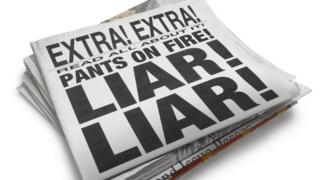‘Fake news’ prompts new focus on media literacy

Since taking office in January, Donald Trump and his administration have issued statements referring to the media as both “fake” and “among the most dishonest human beings on earth.” With this in mind, two Webster University professors see media literacy education as increasingly important in the current political climate.
Media literacy is defined as the ability to access, analyze and evaluate media in all its forms. This means having the capability to recognize propaganda, misleading advertising and manipulation through critical thinking skills, according to the Center for Media Literacy.
Adjunct professor Julie Smith instructs various media literacy and education courses at Webster. One thing she stressed to her students is the importance of media education in the context of today’s society.
“Media literacy education is important for everyone – not just college students,” Smith said. “In fact, some consider it a twenty-first century survival skill.”
Throughout the election, “fake news” was a frequent topic of discussion. Facebook, Twitter and other forms of social media were heavily used during the election season. Politicians such as Hillary Clinton and Donald Trump were able to reach millions in a matter of seconds. This created a new problem for media consumers. In today’s media environment, misleading or false information can be spread quickly.
In response to the controversial new administration, professor Dan Hellinger and the history department introduced a new seminar series. The Political and Historical Implications of the Trump Administration series will cover topics ranging from how populism plays into Trump’s presidency to his policies as he pushes for change.
The seminar series executives plan to host a session directed at the idea of fake news and how it relates to media literacy. The Political and Historical Implications of the Trump Administration seminar series will be held Mondays from 12- 12:50 p.m. in the H. Sam Priest House.
The event is open to the public, but Webster University students can receive one or two credits for attending and participating in sessions. Webster professor of media communications Kit Jenkins is also an advocate for media literacy education.
“We frequently are asked to apply those [critical thinking skills] in the college setting, but when we are out in the world, watching TV, movies or even the news, we tend to let our guard down and just accept what is happening in front of us in the media,” Jenkins said.
Senior Trump advisor Kellyanne Conway has become a prime example of the fraught media environment after calling an inaccurate statement by White House press secretary Sean Spicer an “alternative fact”.
“This is a form of normalizing an impossible idiotic statement,” Jenkins said. “By normalizing the idea that facts can sometimes not be true, the administration is putting all information into the realm of opinion.”
Article Source: http://websterjournal.com/2017/02/08/fake-news-prompts-new-focus-media-literacy/
Image Source: http://ichef-1.bbci.co.uk/news/320/cpsprodpb/CF4B/production/_92276035_istock_19861919_medium.jpg
VOCABULARY WORDS:
1. Prompt (v.) ~ (of an event or fact) cause or bring about (an action or feeling)
2. Propaganda (n.) ~ information, especially of a biased or misleading nature, used to promote or publicize a particular political cause or point of view
3. Adjunct (n.) ~ a thing added to something else as a supplementary rather than an essential part
4. Misleading (adj.) ~ giving the wrong idea or impression
5. Fraught (adj.) ~ (of a situation or course of action) filled with or destined to result in (something undesirable)
6. Realm (adj.) ~ a field or domain of activity or interest
QUESTIONS FOR DISCUSSION:
1. What is your main source of news and current events? Why do you rely on information from that source?
2. What do you think is the best way to find out if the news that you have acquired is accurate?
3. Do you think that information which is directly from the office of the president or someone with high-ranking status is correct? Explain your opinion.
4. Why is it important that the public is aware of what is really happening around them?